- Home
- Lloyd Alexander
The Castle of Llyr (The Chronicles of Prydain) Page 10
The Castle of Llyr (The Chronicles of Prydain) Read online
Page 10
“Please, please, I beg you,” cried Glew, “don’t make things worse than they are! Even now I shall have to boil my potion again. Have you no consideration? No thought for anyone else?”
The giant reached to seize him. Taran raised his sword high above his head in a last futile gesture of defense.
Golden rays burst around him, brilliant as noonday.
With a scream of pain, Glew clapped his hands to his eyes. “The light!” he shrieked. “Stop the light!”
Screaming and roaring, the giant covered his head with his arms. His earsplitting bellows rang through the cave. The stone icicles trembled and crashed to earth; the crystals split and showered Taran with fragments. Suddenly Glew was no longer standing but stretched full length, half covered by the shards, lying motionless where a falling crystal had glanced off his head. Taran, still dazzled, leaped to his feet.
At the entrance to the chamber stood Prince Rhun, the bauble blazing in his hand.
CHAPTER FOURTEEN
The Empty Book
“Hullo, hullo!” called Rhun, hastening to the companions. “I’ve never been so surprised in my life. I didn’t mean to disobey orders, but after I’d crawled out the passage, I—I just couldn’t leave you there to be cooked up; I simply couldn’t do it. I kept thinking to myself that none of you would have gone running off …” He hesitated and looked anxiously at Taran. “You aren’t angry, are you?”
“You saved our lives,” replied Taran. He clasped Rhun’s hand. “I only reproach you for risking your own.”
“Joy and happiness!” cried Gurgi. “Poor tender head is spared from stampings and trampings! And kind master is safe from brewings and stewings!”
“But the most amazing thing was the bauble,” Prince Rhun went on, beaming proudly. “The light didn’t go out, even after I’d got hold of it. Astonishing!” He stared curiously at the golden sphere, whose rays had already begun to dim, and handed it back to Taran. “I don’t know what happened. It suddenly started getting brighter and brighter, all of itself. Unbelievable!”
“It’s the one thing that stopped him,” said Fflewddur. Hands on hips, the bard was looking down at the prostrate form of Glew. “He’d been here so long he couldn’t stand the brightness, the repulsive little grub. There, I’m calling him little again,” he added. “But I still say for a giant he’s remarkably small-natured.” He knelt and peered at Glew’s face. “He’s had a good crack on the head, but he’s still alive.” Fflewddur put a hand to his sword. “We might be wise to—ah—make sure he doesn’t wake up.”
“Leave him,” said Taran, staying Fflewddur’s arm. “I know he tried to do us ill, but I still pity the wretched creature and mean to ask Dallben if he can help him.”
“Very well,” said Fflewddur with some reluctance. “He wouldn’t have done as much for us. But, a Fflam is merciful! Quick, now, let’s be off.”
“How did you climb down?” Taran asked Rhun. “Did you find vines long enough to reach us?”
Prince Rhun’s jaw dropped and he blinked with alarm. “I—I’m afraid I’ve done it again,” he murmured. “I didn’t climb. I jumped. I somehow never thought of getting out again. Surprising, it simply never occurred to me. I’m sorry, I’ve put us right back where we were.”
“Not quite,” replied Taran to the despondent Prince. “We can hoist you up as we did before, and this time you can lower something for the rest of us. But we must make haste.”
“There’s no need for us to stand on each other’s heads,” Fflewddur suddenly cried. “I see an easier way. Look there!” He pointed upward to where a large crack yawned in the cavern wall. A shaft of sunlight fell over the stones and fresh air whistled through the crevice. “We can thank Glew for that. With all his roaring and screaming he’s shaken the rocks loose. We shall be out in no time! Bless the repulsive little monster! He said he wanted to make Mona tremble,” he added, “and, Great Belin, so he did—after a fashion!”
The companions hurried to the wall of the cave and began picking their way through the rubble of broken stones. Prince Rhun, however, halted abruptly and began fumbling with his jacket.
“I say, that’s surprising,” he cried. “I know I put it there.” With an anxious frown he began searching his garments once again.
“Hurry,” Taran called. “We dare not be here when Glew comes to his senses. What are you looking for?”
“My book,” answered Rhun. “Where can it be? It must have fallen out while I was crawling through that hole. Or perhaps …”
“Leave it!” Taran urged. “It is worthless. You’ve risked your life once. Don’t risk it again for a book of empty pages!”
“It was a handsome keepsake,” said Rhun, “and would be useful. It can’t be far. Go ahead, I’ll join you. I shan’t be a moment.” He turned and trotted back toward the tunnel.
“Rhun!” Taran shouted, racing after him. The Prince of Mona disappeared into the chamber. Taran found him on hands and knees groping over the rough floor.
“Splendid!” cried Rhun, glancing over his shoulder. “A little light is what I needed. Now, surely, it’s bound to be here. Let me see, first, where I was climbing up. If it dropped out then, by all rights it should be close to the wall.”
Taran was determined, if need be, to lay hold of the Prince and drag him bodily from the cell which had so nearly become a tomb. He strode forward just as Rhun gave a cry of triumph.
“And there it is!” shouted the Prince. He picked up the book and carefully examined it. “I hope it isn’t damaged,” he remarked. “All that scrambling about might have torn the pages. No, it seems …” He stopped and shook his head in dismay. “I say, that is a shame! It’s ruined. All covered with scratchings and markings. Whatever could have happened?”
He put the leather-bound volume into Taran’s hand. “Look,” he said. “What a pity. Every page is marred. It’s really useless now.”
Taran was about to cast the book aside and carry out his first intention of collaring the Prince, but his eyes widened at the sight of the pages. “Rhun,” he whispered, “these are more than scratchings. It is carefully written. I had thought the pages empty.”
“So had I,” said Rhun. “What could …”
Fflewddur called out, urging them to hasten. Taran and Prince Rhun left the chamber. Gurgi had already reached the opening in the cavern ceiling and was beckoning to them.
“The book we found in Glew’s hut,” Taran began.
“Don’t worry about Glew’s property, worry about Glew,” said Fflewddur. “He’s beginning to stir. Move along or we’ll still end up in one of his potions.”
The sun had just risen, but it was bright and warming after the dank cavern. The companions gratefully breathed the fresh springtime air. Gurgi shouted joyfully and raced on ahead. He soon returned with good tidings: the river lay not too far away. The companions set out for it with all speed.
As they strode along Taran held up the volume to Fflewddur. “There is deep mystery in this. I cannot read the writing; the script is ancient. But how it came there …”
“After what we’ve been through,” replied the bard, glancing at the pages, “I can understand your wanting to jest. But this is hardly the moment for it.”
“Jest? I do not jest!” Taran started as he pointed at the volume again. The pages were empty as they had always been. “The writing,” he stammered. “It’s gone!”
“My friend,” said the bard gently, “your eyes have played you false. At the river we’ll put cool cloths on your head and you’ll feel much better. It’s quite understandable, considering the darkness, the shock of nearly being boiled …”
“I know what I have seen,” Taran protested. “Even in the cavern, even in the dim light of the bauble …”
“It’s true,” put in Rhun, who had been following their talk. “I saw it myself. There’s no mistake. The bauble was shining straight on the pages.”
“The bauble!” Taran cried. “Wait! Can it be?” Hurriedly he drew out the sphere, whil
e the companions halted and watched him silently. As the light blossomed in his hand, Taran held it so that its rays bathed the pages in a golden glow.
The writing sprang into sight, sharp and clear.
“Astonishing!” cried Rhun. “The most amazing thing I’ve seen in my life!”
Taran crouched on the turf, held the bauble close to the book, and with trembling fingers turned leaf after leaf. The curious tracing crowded every page. The bard gave a long, low whistle.
“What does this mean, Fflewddur?” Taran asked. He raised his head and looked with concern at the bard.
The bard’s face had paled. “What it means, in my opinion,” said Fflewddur, “is that we should get rid of the book instantly. Drop it in the river. I regret to say I can’t read it. I could never manage to learn all these secret scripts and ancient letters. But I recognize enchantment when I see it.” He shuddered and turned away. “I’d rather not even look at it, if you don’t mind. Not that it frightens me. Yes, it makes me feel acutely uneasy; and you know my views on meddling.”
“If Glew spoke the truth, it comes from a place of enchantments,” Taran said. “But what can it tell us? I shall not destroy it,” he added, returning the book to his jacket. “I can’t explain; I feel as though I’d touched a secret. It’s strange, like a moth that brushes your hand and flutters away again.”
“Ahem,” said Fflewddur, casting a nervous glance at Taran. “If you insist on carrying the thing with you, would you oblige me—nothing personal, you understand—but I would appreciate it if you’d stay a few paces away.”
Midday was long past when the companions reached the riverbank, but they rejoiced at their good fortune. The remains of the raft were still there. They set to work hastily to repair it. Prince Rhun, in better spirits than ever, labored unstintingly. For a time Taran had forgotten the Prince of Mona was to be Eilonwy’s betrothed. Now the sad thought returned to him as he helped Rhun knot new vines around the raft.
“You should be proud of yourself,” Taran said quietly. “Did you seek to prove yourself a true Prince? You have done so, Rhun Son of Rhuddlum.”
“Why, perhaps that’s so,” replied Rhun, as though the idea had never occurred to him. “But it’s a curious thing. It doesn’t seem one bit as important as it did. Astonishing, but true!”
The sun had begun to dip by the time the raft was ready. Taran, who had grown more and more restless as the day waned, urged the companions to press on rather than wait the night on shore, and they clambered aboard.
Twilight soon fell over the valley, and the Alaw ran in swift silver ripples under the rising moon. The shore lay silent, flanked by brooding hills. In the middle of the raft Gurgi curled up like a muddy ball of leaves; beside him, the Prince of Mona slept and snored peacefully, a smile of contentment on his round face. Taking the first watch, Taran and Fflewddur guided the awkward craft as it rapidly floated seaward.
They spoke little. Fflewddur had not entirely lost his disquiet over the strange book. Taran’s thoughts were for the morrow, which he hoped would bring the companions closer to the end of their search. Once again, fear and doubt made him wonder if he had chosen wisely. Even if Eilonwy had been taken to Caer Colur, he had no cause to believe Magg—or Achren—still held her there. So little was known for certain. The book and its meaning, even the nature of Eilonwy’s bauble, were more riddles added to so many others.
“Why?” he murmured. “Why is the writing clear only when the bauble shines on it? And why did it light for Rhun, when it had never done so before? Why did it light for me, for that matter?”
“As a bard,” answered Fflewddur, “I know a great deal about these enchanted devices, and I can tell you …” At the narrow end of the harp, a string tinkled as it snapped in two. “Ah, yes,” said Fflewddur, “the fact is: I know very little about them. Eilonwy, of course, has the gift of making it light when she pleases. She’s half an enchantress, you know, and the bauble does belong to her. For someone else, I wonder—and I’m only guessing, mind you—I wonder if it might have to do with—how shall I put it—not even thinking about it. Or about yourself.
“What I mean,” Fflewddur went on, “in the cavern, when I tried to make it light, I was saying to myself: If I can do this, if I can find the way for us …”
“Perhaps,” Taran said quietly, watching the moon-white riverbank slip past them, “perhaps you have the truth of it. At first I felt as you did. Then I remember thinking of Eilonwy, only of her; and the bauble showed its light. Prince Rhun was ready to lay down his life; his thoughts were for our safety, not at all for his own. And because he offered the greatest sacrifice, the bauble glowed brightest for him. Can that be its secret? To think more for others than ourselves?”
“That would seem to be one of its secrets, at least,” replied Fflewddur. “Once you’ve discovered that, you’ve discovered a great secret indeed—with or without the bauble.”
The hills had flattened and given way to low fields of sedge. A scent of brine and brackish water reached Taran’s nostrils. Ahead, the river widened, flowing into a bay, and beyond that to an even greater expanse of water. To his right, on the far side of towering rocks, Taran heard the rush of surf. Reluctantly he decided they dared go no farther until dawn. While Fflewddur roused Gurgi and Prince Rhun, Taran poled the raft to shore.
The companions settled themselves amid a tall clump of reeds and Gurgi opened his wallet of food. Taran, still restless, walked to a hillock and peered toward the sea.
“Keep to the shadows,” said the voice of Gwydion. “Achren’s eyes are sharp.”
CHAPTER FIFTEEN
The Island
The Prince of Don rose like a shadow from the sedge. Though he had discarded his head-cloth and tools, he still wore the shabby raiment of his disguise. Perched on Gwydion’s shoulder, Kaw blinked and ruffled his feathers, indignant at being awakened; seeing Taran, however, he bobbed his head and began croaking with excitement.
Taran, startled, cried out. Prince Rhun, waving his sword with great vigor and making as fierce a face as he could, hastened to join Taran.
“Why, it looks like the shoemaker!” Rhun called, lowering his weapon as he caught sight of the tall figure. “Is it, indeed? Whatever have you done with those sandals you promised?”
“Alas, Prince Rhun,” Gwydion replied, “your sandals must wait on other matters.”
“This is no shoemaker but Gwydion Prince of Don,” Taran hurriedly whispered.
Gurgi and Fflewddur had now run up. The bard’s jaw dropped.
“Great Belin!” stammered Fflewddur. “To think we shared a stable at Dinas Rhydnant! Lord Gwydion, had you only made yourself known to me …”
“Forgive me for deceiving you,” answered Gwydion. “I dared not do otherwise. Silence then was my best shield.”
“I would have sought you at Dinas Rhydnant,” Taran said, “but Magg gave us no time. He has stolen away Eilonwy. We have been told of a place called Caer Colur where he might have taken her and have been trying to make our way there.”
“Thanks to Kaw, I know a little of what has befallen you,” Gwydion said. “He told me you had chosen to follow the river. He lost you when Llyan pursued him, but found me here.
“Achren, too, sought Caer Colur.” Gwydion went on quickly. “When I learned this, I strove to follow her ship. One of the fisherfolk sailed with me to the northern coast. Your island people are bold,” he added, glancing at Rhun. “Remember them with honor when you shall be King of Mona. The fisherman would have brought me to Caer Colur itself. This favor I could not accept, for I dared not reveal my mission to him. Yet before he returned to Mona Haven, he willingly gave me the small boat he carried aboard, and would take no reward for his risk or his generosity.”
“Have you already gone to Caer Colur?” Taran asked. “Was there any trace of Eilonwy?”
Gwydion nodded. “Yes. But I have failed to save the Princess,” he said heavily. “She is Achren’s prisoner. Magg moved more swiftly than any
of us.”
“The spider!” cried the bard with such heat that Kaw started up in alarm. “The sneering, sneaking spider! I beg you, let me deal with him. He and I have a long score to settle and it grows longer every moment!” He raised his sword. “I shan’t need this! When I find him, I’ll squash him with my bare hands!”
“Hold, hold,” ordered Gwydion. “Spider he may be, but his sting is all the more deadly. His vanity and ambition have made him Achren’s willing creature. He shall be dealt with, and so shall Achren. Our concern now is for Eilonwy.”
“Can we not free her?” Taran asked. “How closely is she guarded?”
“Last night I rowed to the island,” Gwydion said. “In the little time I remained there, I could not discover where the Princess is held. Though I saw that Achren has but a paltry company of warriors—hirelings and outlaws who have cast their lot with her. None of Arawn’s deathless Cauldron-Born is among them.” He smiled bitterly. “Without the protection of the Lord of Annuvin, haughty Achren commands only lackeys.”
“Then we can attack them now,” Taran cried, his hand on his sword. “We are enough to overcome them.”
“This task calls for strength of a different nature, and swords are not all we shall have to fear,” Gwydion replied. “There is much I have not told you of this matter, and much that I myself did not know. Even now the riddle is not fully answered. But I have learned that Achren’s plans are deeper than I had imagined, and Eilonwy’s plight graver. She must be taken from Caer Colur before it is too late.”
Gwydion drew his cloak around him and stepped toward the riverbank. Taran caught his arm. “Let us go with you,” he urged. “We shall stand with you should you need us and guard Eilonwy’s escape.
The tall warrior paused and glanced at the waiting companions. He turned his green-flecked eyes on Taran and studied him closely. “I do not doubt the courage of any one of you. But Caer Colur holds greater peril than you know.”

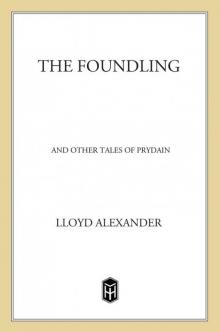 The Foundling and Other Tales of Prydain
The Foundling and Other Tales of Prydain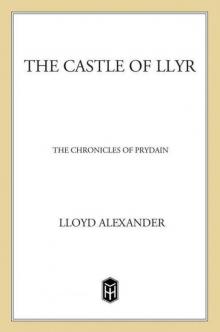 The Castle of Llyr
The Castle of Llyr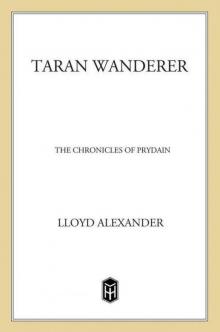 Taran Wanderer (The Chronicles of Prydain)
Taran Wanderer (The Chronicles of Prydain)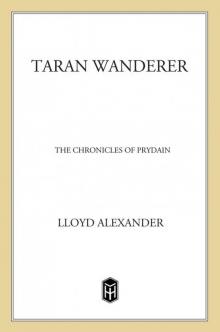 Taran Wanderer
Taran Wanderer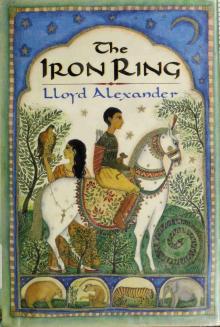 The Iron Ring
The Iron Ring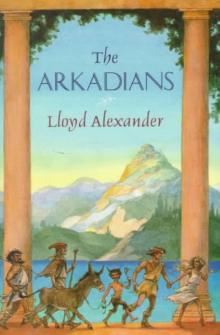 The Arkadians
The Arkadians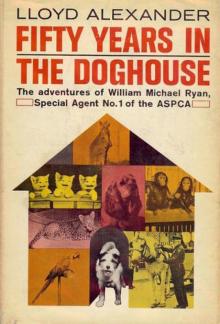 Fifty Years in the Doghouse
Fifty Years in the Doghouse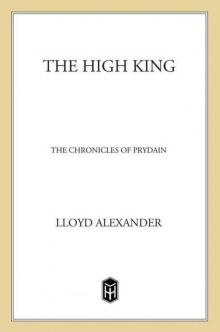 The High King
The High King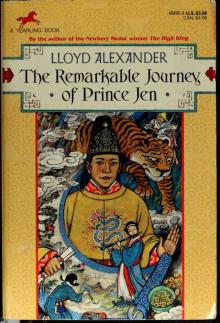 The Remarkable Journey of Prince Jen
The Remarkable Journey of Prince Jen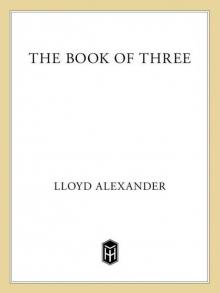 The Book of Three
The Book of Three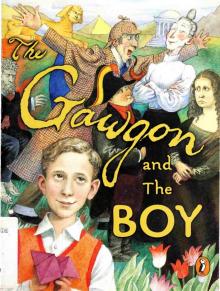 The Gawgon and the Boy
The Gawgon and the Boy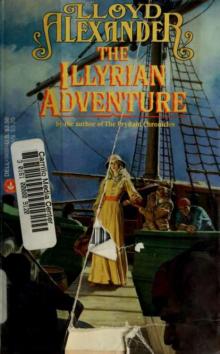 The Illyrian Adventure
The Illyrian Adventure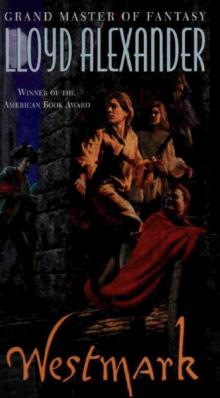 Westmark
Westmark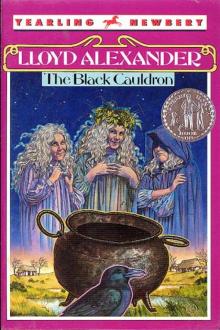 The Black Cauldron
The Black Cauldron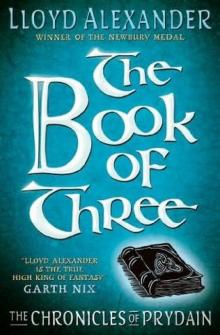 The Book of Three cop-1
The Book of Three cop-1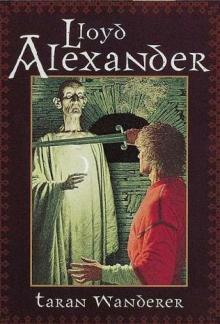 Taran Wanderer cop-4
Taran Wanderer cop-4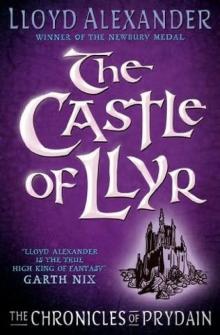 The Castle of Llyr cop-3
The Castle of Llyr cop-3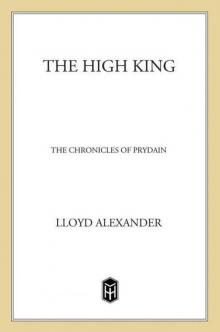 The High King (Chronicles of Prydain (Henry Holt and Company))
The High King (Chronicles of Prydain (Henry Holt and Company))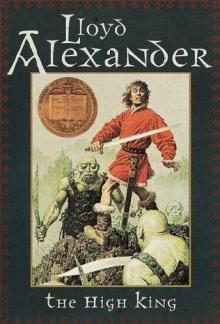 The High King cop-5
The High King cop-5 The Foundling
The Foundling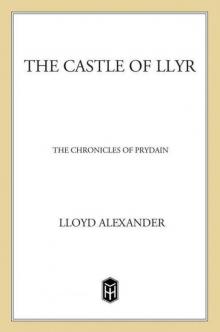 The Castle of Llyr (The Chronicles of Prydain)
The Castle of Llyr (The Chronicles of Prydain)